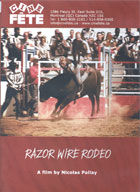
Razor Wire Rodeo 2009
Distributed by CineFete, 1586 Fleury St. East, Suite 210, Montreal, Canada H2C 156; 800-858-2183
Producer n/a
Directed by Nicolas Pallay
DVD, color, 52 min.
General Adult
Criminal Justice, Human Rights, Sociology
Date Entered: 05/20/2011
Reviewed by Linda Frederiksen, Washington State University, Vancouver, WALouisiana has the largest prison population in the United States. Touted by its politicians as a state that is ‘tough on crime,’ more than 5000 prisoners are incarcerated at the Louisiana State Penitentiary, a maximum security facility in Angola, LA. Known as the Alcatraz of the South or, simply, The Farm, Angola is a former slave plantation whose inmates have little chance of escape, appeal, or parole. For these men, 80% of who are poor and black, the only way out is death by incarceration.
One distraction from this hopeless fate is the Angola Prison Rodeo, a popular but controversial activity staged twice annually on the inside of the prison’s razor wire fences. Started in 1965, the Angola rodeo attracts thousands of visitors to the facility’s own arena every year. For the prisoners who volunteer for the rodeo, the events provide a release from what will be a lifetime of monotony as well as an opportunity to excel at something athletic that is visible to families, friends and a society from whom they are now cut off and forgotten. At the same time, there is a brutal gladiatorial aspect to the rodeo that is more troubling than the prisoners’ underlying motivations for participation. Although the inmates wear some protective padding under their black and white striped shirts, they are not permitted to train for such dangerous rodeo activities as Brahma bull-riding and convict poker, where a wild bull is released into the arena with the purpose of unseating the players. The resulting injuries, and the crowd’s seeming pleasure in seeing them, go beyond simple entertainment.
The film, produced by Swiss documentarian Nicolas Pallay, uses the October, 2006, rodeo season as the focus of a forceful indictment of the American criminal justice system in general and the underlying racism of Louisiana prisons in particular. Realistically photographed and crisply edited, numerous short interviews with inmates and family members, prison personnel, critics and proponents of the rodeo are combined with live action event footage of the prisoners and the crowd. It is a discouraging but thought-provoking examination of a system that is more intent on punishment than rehabilitation. Recommended.